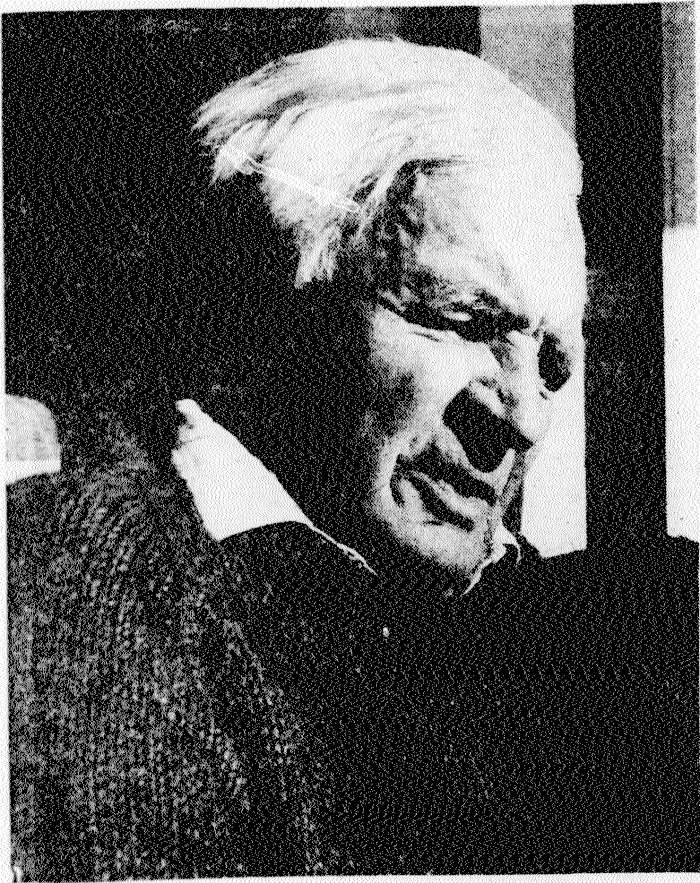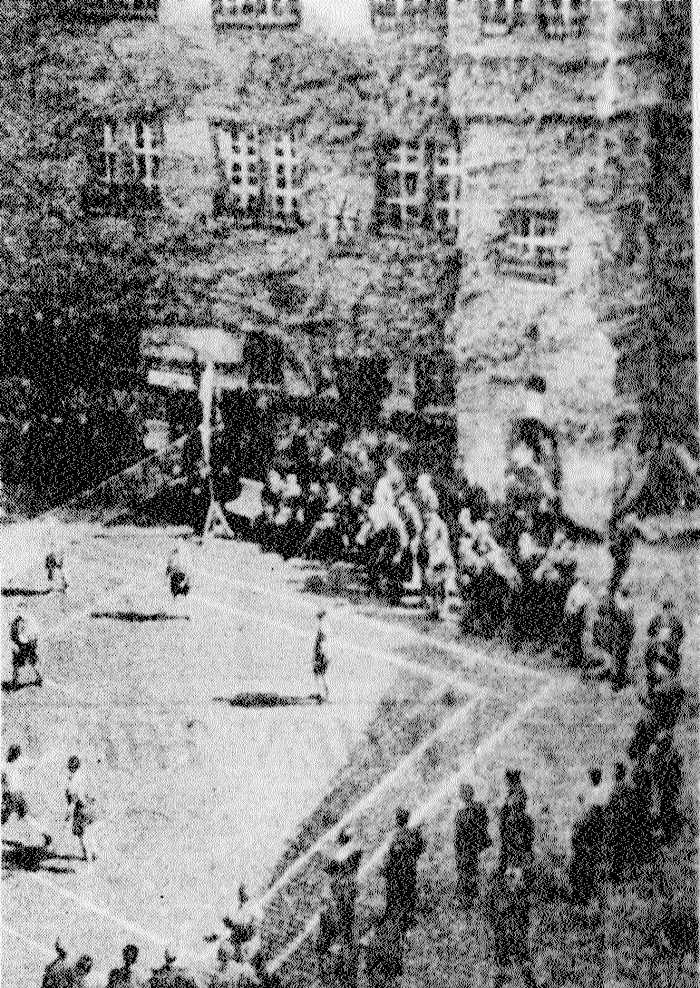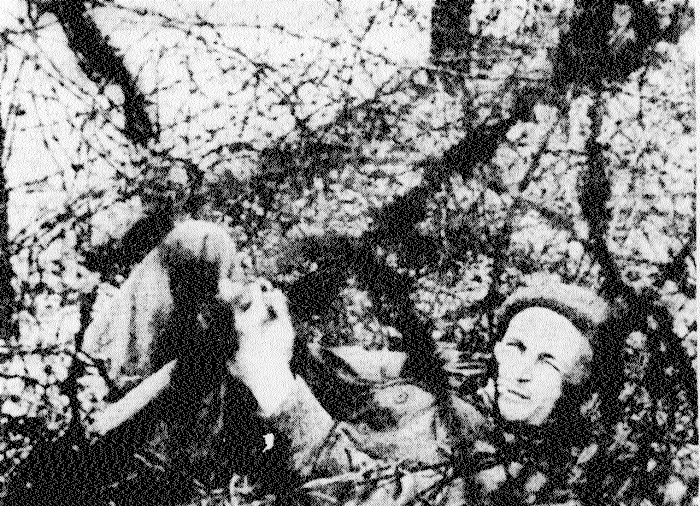From The Press, 26th of July 1975:

These photographs show Captain Upham more than 30 years apart—a soldier of World War II, and a farmer at home at Conway Flat today.
 C. H. Upham, V.C., recalls Colditz Castle
C. H. Upham, V.C., recalls Colditz Castle(By GARRY ARTHUR)
When the B.B.C. was making the “Colditz’’ television series, it invited the Nev Zealand double V.C. winner, Charles Upham, to go back to the grim castle where he spent the last year of the war.
But he turned the offer down. The time when he wanted to go back was immediately after the war — and he wasn't planning any sentimental journey then. He wanted revenge.
As well as being a persistent escaper, his file was marked: “Has an incorrigible hatred of the German people." He admits today that that was true.
"I couldn’t stand the sight of them,” he said. After seeing what the S.S had done to his fellow prisoners — many of them captured spies — and getting the treatment himself in Colditz, there were Germans he wanted to track down. He tried to enlist in the occupation force to carry out his plan, but the British would not let him. No doubt they knew his purpose.
Today Charles Upham has mellowed a bit toward the German-. — but not much In the peace and solitude of his beautiful coastal farm at Conway Flat, North Canterbury, he watches the “Colditz’’ story on television, and remembers how it really was for him and the handful of other New Zealanders imprisoned there.
“Most of those films are all right if you weren't there," he said. He thinks the B.B.C. has captured the spirit of Colditz pretty well, and he even found a lot of truth in the comedy series “Hogan’s Heroes." But there was little of “Hogan’s Heroes" in Colditz.
Strong morale “The German guards wouldn’t speak to you there," he recalled, "and they wouldn't turn their backs on you. They were frightened of us, and they were frightened of their own people.”
But morale in Colditz was marvellous. “You see," he said “there were always fellows worse off than yourself. There were a lot of fellows who had been very badly wounded — one with both ears burnt off in a plane crash. You could hardly look at his face. He was practically blind, his nose was burnt off, and he should have had plastic surgery, but of course he couldn’t get it.
"Some had gone a bit round the bend. But people didn’t moan and grumble, because one of their friends would say: Well you're a lot better off than so-and-so.’ ”
When Captain Upham got to Colditz, it really was virtually “escape-proof."
“We were all the time watching for ways out." he said "but they’d woken up to everything.
"We could pick locks there. There was a fellow there called Bush Parker, a very young Australian fighter pilot. He could pick any lock. I don't know what he’d done in civvy street. But he could make a key and pick practically any lock, given time.
"And we had tunnels out of our place and into their place, things like that. They were finding them all the time, and we’d build another one.
Thick walls “Some of the castle’s interior walls were about 4ft thick. It was a rambling place, and you could make false walls and things. Some of the rooms had been bricked up 300 years ago, and I don’t think the Germans knew they were there. You could only find them after about a year of tapping around.
“We wrecked about half the inside of the place trying to get timber to cook with. After we had finished with it practically all the timber in there was only a veneer. It had been removed — laboriously pared down with razor blades — and there was practically nothing left. It was collapsing.’’
Some of the British prisoners made a glider on the castle roof. “It would have would have worked all right — you could have got out, because the place was very high. They made it in sections of pieces of wood about as thick as a match. It took years to make, but it wasn’t finished when the end of the war came
“To have about 10 men working on it you had to have about 20 others keeping guard. We called them stooges.
“You were standing about with a fellow watching you, and if you took your hat off or something like that, that was the cue for these fellows to get out.”
Mr Upham said he never had a promising escape attempt at Colditz. “We were going to get off the roof there one night,” he said, “but we’d never have made it.
“It was a very, very steep slate roof, and there were catwalks all around with sentries on them. There were Alsatian dogs inside the perimeter, and there were searchlights all the time lighting up the whole place. It was only in air raids that they put these searchlights off.
“All these places used to put the searchlights off when there were air raids, because aircraft could get their directions from these camps sticking out like sore thumbs all over Germany.
“That was when the guards were most jittery, they would fire at anything — you could chuck something out the window and there would be a burst of fire.
“That’s when we used to get out and have a look round. But attempts at escape were pretty nil by the time I got there.”
One of the other New Zealanders at Colditz was Edgar Hargreaves, the first British officer to be trained as a paratrooper, a saboteur and intelligence observer in the Middle East and Yugoslavia. A Christchurch man, he was a close friend of Captain Upham’s, who was best man at his wedding. He led a real cloak-and-dagger existence before being captured in 1943. Before landing up in Colditz, he saw the inside of several Gestapo prisons, and was beaten and tortured in attempts to get information from him.
Two Maoris “There was a Dr Bull from Wellington,” said Mr Upham, and Dr Fred Moody, head of the Auckland Hospital Board, was there for a long time. He acted as our doctor there, a very good fellow.
“And right at the end there were two Maori boys — one called Pvte B. Mac Lean and one with, I think, a name like Rewai. They didn’t know why they were sent to Colditz.
“The Germans were very spiteful. They hated the Maoris. They seemed to hate Americans most. And they disliked New Zealanders, Australians, and Canadians. They seemed to be more friendly with the French and English than they were with us.
“They always reckoned New Zealand had no business to be in the war. They couldn't understand it. They hated America because they always thought America wouldn't come into the war. And they didn’t like coloured people.”
Among the prisoners at Colditz were what the Germans called the “Prominentes” — relatives of important people — the American ambassador’s son, the Queen’s cousin, a nephew of Churchill’s, a nephew of General Alexander.
“They thought they could use them for barter,” said Mr Upham. "They had Rothschild, the big Jewish banker, at Colditz before I was there.
They ransomed him, I believe for $7m in gold, to the big American jews. Stalin's son “They had Stalin’s son there at one time. I think they murdered him, or he died afterwards. They had him in a glass bowl like a goldfish — about a 6in thick bulletproof glass bowl with a hole in the top, and a light on all the time. He was in the army.”
One prisoner was an elderly French general. “He hated the Germans, and he was a very sick man. In the end the Germans said they’d take him away to a hospital.
“We were suspicious. They hated this particular fellow and he hated them and they did a thing that I never, forgave them for. They came in one day to take him away and the moment he was outside the gate we heard the shot. They shot him.
“They said he was trying to escape — well, the old fellow could hardly walk."
There was no love lost between guards and prisoners. “Any fellow we didn’t like towards the end of the war, we used to say in his hearing — direct to him — that we had put him on the black list. That we were going to do him in after the war, and make sure of it.
"There was one rotten little S.S. bloke there in a black uniform, I told him one day, I said: ‘Schwarzeliste’ (that’s the black list).
“He told me he would do me in before he left. He’d find a reason. He hated me like poison, this particular one. He was a little corporal in the Death’s Head Hussars, I think they called them. But I didn’t catch up with him. They all cleared out in the night.”
Files kept Mr Upham remembers the Germans as great bureaucrats — sticklers for rule-of-thumb. “You always knew what a German was going to do,” he said. "If the sentries were told to go up and down, they’d never move from that beat. You could turn this to advantage.
"With Italians, on the other hand, you never knew what they were going to do. They were much more cunning.
“The Germans had terrific files on us, and a terrific number of people working in the office. The few letters we got and sent were all copied laboriously in triplicate. We found all this out after the war.
“I had a file about 4in thick. We went into the Kommandantur — which was their part — when the war ended, and we collected these files. It was quite funny to get someone to translate their description of you. They were very frightened of you changing identity with someone else. They had your fingerprints.
“Once a week, every Thursday, they had a special roll-call and you had to go into a room one at a time.
"The Abwehr officers looked you up and down, and looked at the card they had on you, and they might take your fingerprints again, and compare them, and measure you and look at you sideways.
"The Colditz commandant wasn’t as nice a fellow as the one in the television series, who is shown as quite a nice chap.
‘Rotten swine’ “The Abwehr officer was quite different to that one on the television now. He was a rotten little swine. I couldn’t stand him.
“And our senior British officer was not like the man in the film either. He was a particularly good fellow called Colonel Todd.
“There was only one German officer there that you’d give sixpence for really. That was a fellow called Pupke.
“He wasn’t spiteful. He wasn’t friendly either; he was just correct. He never went out of his way to be nasty.
“There was always a waiting list to go in the cells. When it got very long at one time they sent the fellows down to a civilian prison in the village. Well, that was the most marvellous thing to go to. Everyone tried to get there.
"The food was better and you were in with pickpockets and blokes like that. It was friendly, and on Sundays all their girlfriends used to come out with cakes and things for them.”
At Colditz the rations were almost non-existent at times, said Mr Upham. "If it hadn't been for the Red Cross parcels there’d have been nothing.”
Big battle Right at the end there was a big battle near Colditz. “The American 64th Division came in,” said Mr Upham, “and Colditz castle stood right out on a rocky hill. The Americans used it as a sort of checkpoint for their shells. The first shot they fired went right through the roof of the place. They would have demolished it, but our fellows had made a French flag and a Union Jack, and these saved us, by 10 seconds.”
Nearly all the S.S. guards had gone by then. They had a fight with the ordinary guards down below. Liberated from Colditz, Captain Upham walked down to the village.
“There was a big brickworks there full of Russian women,” he said, “and there was a concentration camp of Hungarian Jews just down below us. There were only three left alive. We found them under the heaps of corpses.”
Prompted by his wife, Molly, he admits today that he has met some “nice” Germans lately. But when he meets Germans, on an aircraft or anywhere, he still asks them about concentration camps. If they deny knowing anything about them at the time, he calls them bloody liars to their faces.
“Everyone in Germany knew,” he said. “Even the children. There was a concentration camp outside every city — they could see the chimneys smoking.”

ABOVE—Oflag IVc, Colditz.

Volleyball in the courtyard at Colditz.

Captain Upham after his unsuccessful daylight attempt to get over the wire at Oflag Va, Weinsberg. For such behaviour he was sent to Colditz.

